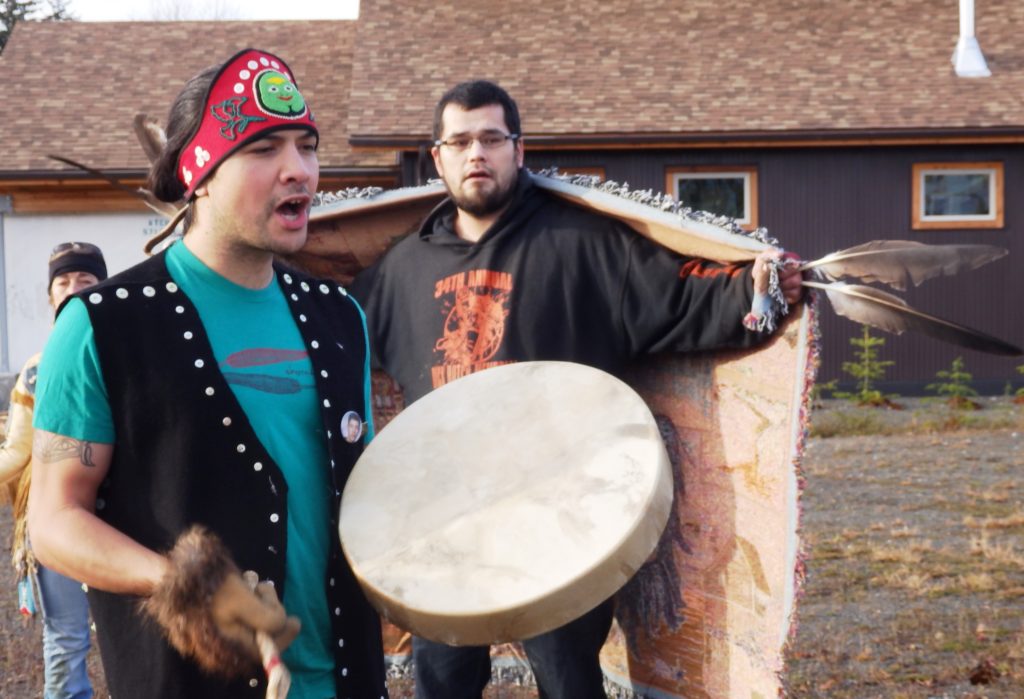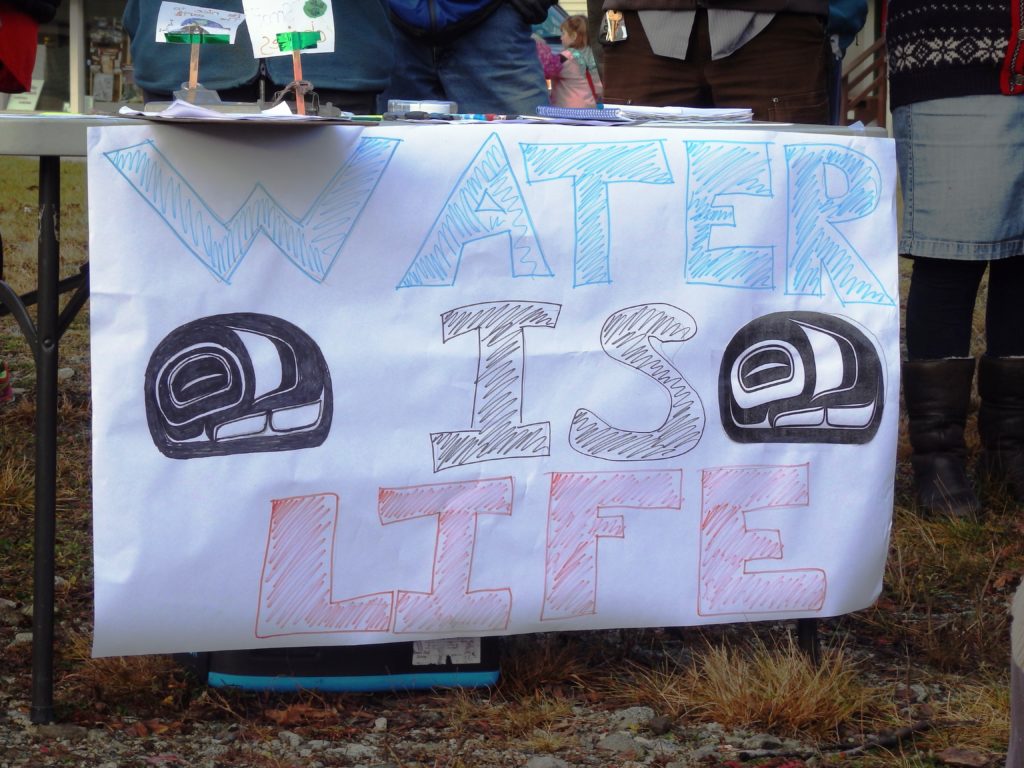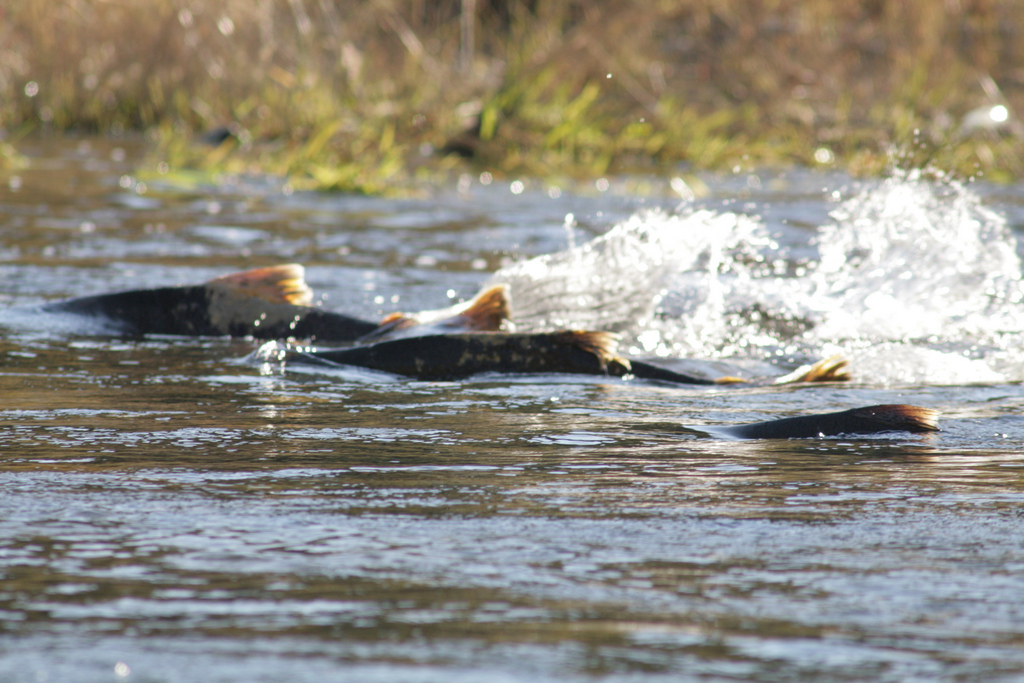
Haines resident rally in solidarity with the Standing Rock Tribe Tuesday. (Emily Files)
In North Dakota, the Standing Rock Sioux Tribe is protesting construction of the Dakota Access oil pipeline. The protest to protect water and sacred land has drawn thousands of supporters to the site. The cause has resonated with people in Haines as well. On Tuesday, about 40 people gathered downtown in solidarity with the Standing Rock tribe.
Ted Hart is a member of the local Chilkoot Tribe. He came to the rally at Third and Main with his 14-month-old son, Adze.
“You know, we need to think about our next generations,” Hart said. “The indigenous people always thought — whenever they made a decision they considered the next seven generations. And I think that’s very important and that’s what kept this culture alive for thousands of years. It was about balance and reciprocity.”
Hart says that’s what the protests in North Dakota are about: protecting natural resources, especially water, for future generations. He said a Tlingit prayer before leading the group in four songs.
“This first one is a canoe song,” Hart said. “The Tlingits were a water people. They traveled these waters hundreds of miles in dugout canoes.”
Hart was joined in dance by Larry Sweet Jr.
“I just wanted to thank my brother here for inviting me to be with his group,” Sweet said. “[Hart] is Chilkoot, I am Chilkat, from the Kaagwaantaan. So I’m Eagle Thunderbird. But being here with the group and seeing the amount of support is a very heartwarming thing to see. So it’s not just our relatives down south that are dealing with this. We are lifting them up.”

Ted Hart and Larry Sweet Jr. sing and dance at the rally. (Emily Files)
“No matter where you are, you have to raise your voice,” said Hannah Bochart, who helped organize the rally.
“I consider this to be one of the biggest social struggles of this decade, at least,” she said. “There’s over 300 tribes that have gathered [in North Dakota] from all across the world. And they’re saying this is the biggest movement of Native American peoples in over 100 years of American history. So we here believed we need to honor that, even though we’re so far away.”
It wasn’t just people in Haines who gathered Tuesday for this cause. Protest leaders put a call out across the country, dubbing Nov. 15 the Nationwide Day of Solidarity for Standing Rock.
“On Oct. 27, Water Protectors including myself and others were attacked by police from several states and the Army National Guard for trying to protect the water,” said one protest leader in an online video calling for action. “In response to this vicious attack, the Indigenous Environmental Network, Honor the Earth and many of our allies are calling for a nationwide day of solidarity on Nov. 15, a week after the election at Army Corps offices around the country.”
The protesters are asking the Army Corps of Engineers not to grant an easement to build the pipeline under the lake at the center of the outcry. Lake Oahe is a water resource for the Standing Rock Reservation. National news outlets report that the Army Corps delayed granting that easement this week in order to get more input from the tribe.

A sign at the Haines rally. (Emily Files)
“For hundreds of years, the U.S. Army and Native people have been at odds,” said Tara Houska of the organization Honor the Earth in the call-to-action video. “It’s time we stepped forward and started a new chapter together.”
When Haines resident Renee Hoffman saw the call to action, she organized this rally.
“I get really tired of seeing that this is my country, allowing these things to happen,” Hoffman said.
At the rally, organizers collected signatures to send to the Army Corps office in Juneau urging the rejection of Dakota Access Pipeline permits. Bochart also hopes to send warm clothes and boots to North Dakota to help the hundreds of protesters there endure winter weather.
“We’re Americans, we have to take care of each other,” Bochart said.









